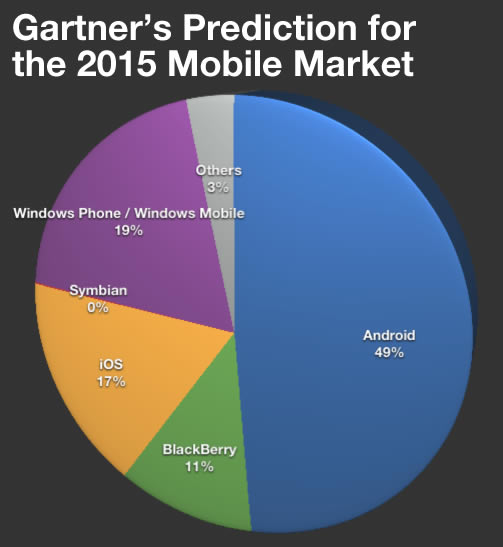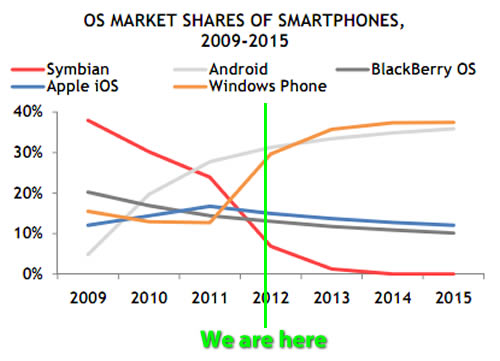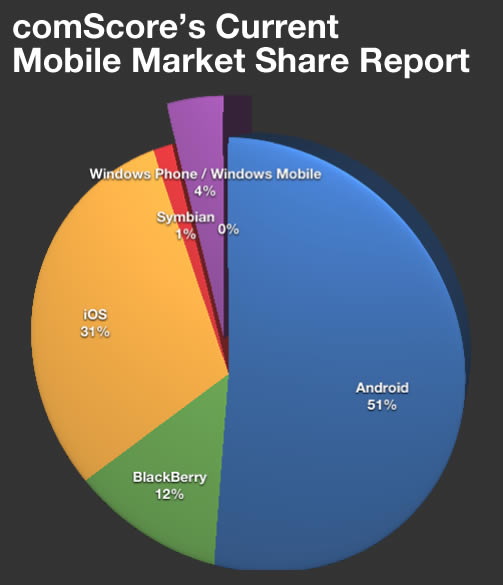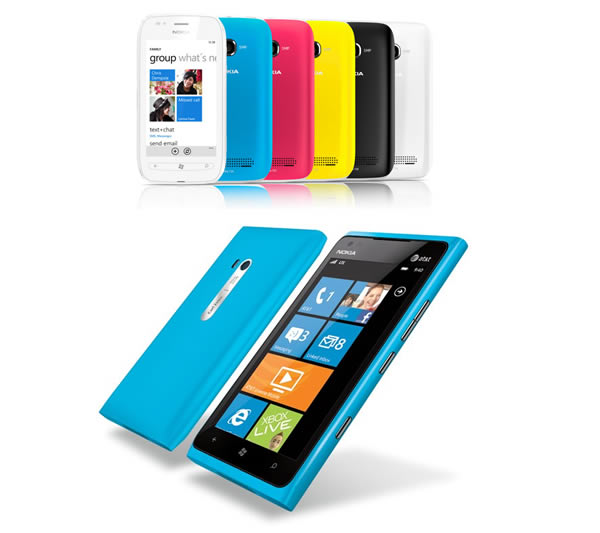IDC’s Prediction: Almost 6% Market Share in 2011, 21% by 2015

Near the end of March 2011, IDC forecasted in their Worldwide Quarterly Mobile Phone Tracker report that by 2015, Windows Phone 7 would have leapfrogged past BlackBerry and iOS to claim the number two spot, with almost 21% market share:
| Operating System | Predicted 2011 Market Share |
Predicted 2015 Market Share |
|---|---|---|
| Android | 39.5% | 45.4% |
| BlackBerry | 14.9% | 13.7% |
| iOS | 15.7% | 15.3% |
| Symbian | 20.9% | 0.2% |
| Windows Phone 7 and Windows Mobile |
5.5% | 20.9% |
| Others | 3.5% | 4.6% |
They wrote:
Nokia’s recent announcement to shift from Symbian to Windows Phone will have significant implications for the smartphone market going forward. “Up until the launch of Windows Phone 7 last year, Microsoft has steadily lost market share while other operating systems have brought forth new and appealing experiences,” added Llamas. “The new alliance brings together Nokia’s hardware capabilities and Windows Phone’s differentiated platform. We expect the first devices to launch in 2012. By 2015, IDC expects Windows Phone to be number 2 operating system worldwide behind Android.”
Gartner’s Prediction: Almost 6% in 2011, 11% in 2012, 20% by 2015

A few days later, Gartner published a press release making a similar prediction: Windows Phone would claim about a fifth of the smartphone market by the end of 2015. Here’s their breakdown:
| Operating System | Predicted 2011 Market Share |
Predicted 2012 Market Share |
Predicted 2015 Market Share |
|---|---|---|---|
| Android | 38.5% | 49.2% | 48.8% |
| BlackBerry | 13.4% | 12.6% | 11.1% |
| iOS | 19.4% | 18.9% | 17.2% |
| Symbian | 19.2% | 5.2% | 0.1% |
| Windows Phone 7 and Windows Mobile | 5.6% | 10.8% | 19.5% |
| Others | 3.9% | 3.4% | 3.3% |
They wrote:
Gartner predicts that Nokia will push Windows Phone well into the mid-tier of its portfolio by the end of 2012, driving the platform to be the third largest in the worldwide ranking by 2013. Gartner has revised its forecast of Windows Phone’s market share upward, solely by virtue of Microsoft’s alliance with Nokia. Although this is an honorable performance it is considerably less than what Symbian had achieve in the past underlying the upward battle that Nokia has to face.
Pyramid Research’s Totally Crazy-Ass Prediction: Number One in Market Share by 2015, with Nearly 40%
On May 9th, 2011 — almost a year ago to the day — came the most unbelievable of the Windows Phone predictions. Pyramid Research announced that Windows Phone’s market share would edge past Android’s, with almost 40% of the smartphone market. Here’s the graph they published, with a vertical line I added to make it easier to read the current market share:

Here’s what they wrote (with additional emphasis by me):
Now, a couple of words about the “controversial” projection itself. While we acknowledge the momentum that Android is experiencing and will continue to experience in 2011 and 2012, we believe that Nokia and Microsoft are a very powerful tandem, and that will show in its full force by the end of 2013. Some of the main obstacles to the growth of WP to date will be removed, as Nokia helps with bringing down the price of WP smartphones. Lower price of the devices will be the crucial prerequisite for the expansion of WP models. Nokia knows it and Microsoft knows it, and I am sure they will act on it quickly. It’s also worth mentioning that, apart from Nokia, quite a few other large handsets vendors in the world, such as Samsung, LG and Sony Ericsson are still placing their bets on WP. With the change in the price of WP devices, and the multivendor strategic approach of Microsoft, the main advantage of Android – scale – may be removed.
And although Nokia has suffered a significant loss from dragging out the Symbian story for too long, it’s Nokia we are talking about: They are big enough and strong enough to take on a couple of painful hits and come out of the struggle stronger than ever. They are in a good position to learn and adjust because they know what was bad about Symbian, what’s creating gains and what’s causing problems for Android, as well as what the upsides and downsides of a system such as that of Apple, where the OS only runs on hardware manufactured by the vendor.
Don’t forget that while being late to the party is rude, everybody gets to see you enter the room. When Nokia “enters the room” with new WP-based devices, there will likely be much traction about its new “clothes and shoes,” which will be a good jump start for the new era of WP devices.
And Where are We Now?
IDC predicted that Windows Phone would have a 5.6% market share by the end of 2011. Gartner’s prediction was that Windows Phone would have nearly 11% of the phone market by the end of 2012. And from eyeballing Pyramid Research’s chart, Windows Phone’s market share should be about 27%.
Let’s now take a look at the latest comScore report, published on May 1st, 2012:

| Operating System | December 2011 Market Share |
March 2012 Market Share |
|---|---|---|
| Android | 47.3% | 51.0% |
| BlackBerry | 16.0% | 12.3% |
| iOS | 29.6% | 30.7% |
| Symbian | 1.4% | 1.4% |
| Windows Phone 7 and Windows Mobile | 4.7% | 3.9% |
Before I talk about the comScore numbers, I’d like to remind you that they need to be taken with a grain of salt.Be sure to read MG Siegler’s article about comScore’s and NPD’s numbers — while they suggest that “Android is winning”, there seems to be a lot wrong with their math when it comes to iOS’ and Android’s market shares. However, for the smaller players, it should be safe to assume that their numbers are closer to correct.
IDC’s, Gartner’s and Pyramid Research’s predictions seem to be quite near comScore’s numbers for how much market share BlackBerry’s OS would have in 2012.
When I was a Microsoft developer evangelist and one of Microsoft Canada’s Windows Phone Champs, I would’ve defined the first couple of years’ market shares predicted by Gartner — 6% by the end of 2011, 11% by the end of 2012 — as a “reasonably good” outcome, and I’d have called Windows Phone in a close tie with BlackBerry OS (with say, 15% of the market by 2012) as “awesome”. Were I still in that job today, I’d describe the current comScore numbers, and especially the drop to below 4% between December and March, as “distressing”.

Tomi Ahonen, who probably knows more about Nokia than anyone outside the company, recently wrote (once again, the emphasis is mine):
Have you braced yourself for the shock? Lets do updated (downgraded) forecast for Nokia smartphone market share, average price and revenues for 2012. The quick version? Nokia’s current 8% market share in smartphones, that was 29% just over a year ago, will fall to 3% by year-end. Nokia’s smartphone unit will not return to profits and while the industry grows by over 50% this year, Nokia’s smartphone unit revenues will be cut almost in half.
…
If you want to consider Windows Phone as the so-called 3rd ecosystem (in reality no better than 5th or 6th), then as we just heard, LG is now not continuing Windows Phone production either, following Sony’s earlier pull-out of Windows Phone commitments, this ‘Third Ecosystem’ is proving a bigger farce every day. What can you add from the Samsung and HTC partners to the above Lumia numbers. Maybe half a million per quarter if we’re lucky, more likely half that number. So your Windows Phone new sales are pretty close to what you see here. Microsoft will end 2012 selling perhaps 19 million Nokia branded smartphones, if you toss in 2 or 3 million more by all other Windows Phone partners, even 22 million will not get you more than 3% global market share of new sales and Windows Phone ‘Third Ecosystem’ would end the year with under 2% of the installed base of all smartphones. Does this smell dead to you?
The class action lawsuit against Nokia by some of its shareholders isn’t helping things, either.
What It Means for You, the Mobile Developer

Simply put, it means the predictions are dead wrong — and in Pyramid Research’s case, delusional — and you’d best run away from this platform as quickly as your feet will take you. Unless there’s some massive change in Microsoft’s strategy — maybe there’ll be a Windows 8 miracle, but I wouldn’t bet on it — do not look back, just high-tail it out of there. There’s a lot of interesting stuff happening in the mobile world, but it ain’t happening in Windows Phone land.
Windows Phone’s market share remains stuck in the single digits nearly two years after its launch. It’s well below 10%, which in my opinion is the minimum market share for a smartphone OS to remain viable, and that’s assuming that the OS has some kind of edge that the others lack. Nokia, the flagship hardware partner, is circling the drain, and the others — Samsung, HTC, LG (and LG’s a bit iffy) — are hedging their bets with Android. And then there’s the retail angle: the iPhone has the Apple Stores as their best promoters and Android gets a lot of love from the telcos. For a brief shining moment, Nokia’s Lumia 900 Windows Phone was the best-selling phone at Amazon.com, but as of this writing, it’s in 15th place.
The Windows Phone has OS some great design ideas, and Nokia have put together the nicest Windows Phone hardware ever. Windows Phone is probably the easiest mobile phone OS to build native apps for. As a guy who used to evangelize it to anyone and everyone (I still have the I [heart] Windows Phone sticker on my accordion), it’ll always be special to me. In spite of all that, I can’t recommend developing for Windows Phone unless you’ve got a customer who’s willing to pay big bucks for that development (and for more than a few developers, that customer is Microsoft).
In writing this, I was reminded of a conversation I had with one of the leads of the Windows Phone Champs team shortly after “Windows Phone 7 Series” was announced in March 2010. I asked what I thought was a pertinent question: “How do we counter when people say that Windows Phone is too little, too late?”
“Well, I think it’s a bit early in the game, and we shouldn’t worry about that right now,” he replied.
It was the right answer back then. Now, I don’t think there’s an answer anymore — especially since he left Microsoft to work at Amazon.
24 replies on “The Windows Phone Predictions that IDC, Gartner and Pyramid Research Probably Hope You’ve Forgotten”
Well I can see leaving MS was a prudent move for you! lol . But I think making a call on those numbers is a little premature, like basic a sell rating on a stock on previous quarters before we can see the results of a company’s long term new strategy. Wait! that’s exactly what it is! The Lumia series has only finally given people real reason to show some interest in WinPhones, and now we are seeing some genuine interest in it as a superior alternative to Android, especially from my own social network at least. There is still a LOT that MS and Nokia can do to bollocks this up, but we’d have to at least wait till past this coming xmas to come to any kind of decisive conclusion.
Btw still pushing on with (or really coming back to) the idea that was inspired via the early look from the loaner phone provided by yours truly. Have had a mountain of non programming-related/Canadian problems to push on with aside from the technical challenges to solve in this case but aiming for the October/Christmas date this year. Maybe I’ll have some time to catch up once I’ve finally actually shipped something and can finally leave this country.
The Nokia platform out now and is DOA. In 5 months when Windows Phone 8 hits (October is the call right) these phones are obsolete. Why would I buy a windows phone now knowing that I can’t upgrade it to WP8? That whole story is a mess and is part of the reason people are looking elsewhere.
If Microsoft wants to even approach 10% market share, they need to be giving away handsets to customers, 0$ handsets.
[…] it rains, it pours. Just hours after I published my article on the way-off predictions on how well Windows Phone would do and cited the comScore numb…, Neilsen releases their findings, which are pretty similar. According to their survey, 50.4% of US […]
Like. :)
I think MS needs to retarget their marketing. 1. Tap into the huge xbox user base and direct market to xbox live account holders. Yes this is a much younger demographic 2) make it cheap for mom and dad or as todd mentioned give it away!
Kids drive what parents buy and most parents dont care what kind of phone they have but throw in a free windows phone if i buy one for my kid(s) and im game.
[…] says that Android shipments will peak this year as mobile shipments slow, but they also predicted that Windows Phone will have at least 20% market share by 2015. An appropriately-sized grain of salt is […]
[…] readers of this blog will know that I recently wrote about IDC’s predictions for smartphone market shares that they made back in M… Let’s review […]
[…] will be 53 million iPad users in the US by the end of the year. They say that by 2015 — although we should remember to be suspicious of such predictions — that there will be 91 million of them. That’s just under one in three people in the […]
[…] This isn’t the first time someone with a large audience has said “Windows 8 on mobile devices, good; Windows 8 on desktop, bad,” but we have to keep in mind that the other person was from Gartner, who have been known to make terribly, terribly wrong predictions (including ones about the size of the Windows Phone market). […]
[…] Kantar aren’t the only people who think this way. Gartner don’t just think that Windows Phone will capture third place; they’ve predicted that it will make it to second place by the end of 2015 — 6% of the ma…: […]
[…] with their predictions, I tend to take Gartner’s Magic Quadrant with a huge grain of salt, and it appears I’m […]
[…] opportunities exist. Speaking as a former Windows Phone Champ, I think I can safely say that my one post about ridiculous Windows Phone market share predictions has made more money through Google AdSense than most Windows Phone […]
[…] Recovering Windows Phone Champ that I am, it pains me to see that Microsoft’s share has dropped from 3.6% to 3.0% (it also relieves me that I’m no longer involved with that train wreck). It’s a far cry from Gartner’s predictions — and yes, I’m going to keep pointing back to them from time to time: they said that by now, they expected Windows Phone to have made off with nearly 11% of the market. […]
[…] Recovering Windows Phone Champ that I am, it pains me to see that Microsoft’s share has dropped from 3.6% to 3.0% (it also relieves me that I’m no longer involved with that train wreck). It’s a far cry from Gartner’s predictions — and yes, I’m going to keep pointing back to them from time to time: they said that by now, they expected Windows Phone to have made off with nearly 11% of the market. […]
[…] Here’s a chart based on IDC’s predicted mobile OS market share for 2015: […]
[…] Here’s a chart based on IDC’s predicted mobile OS market share for 2015: […]
[…] far short of expectations since its debut in October 2010, forcing some analyst firms to revise sky-high forecasts for the platform. It has struggled to attract the attention of developers, as Evans noted, leaving […]
[…] that we’re at the start of 2014, it’s time to look again at some old predictions on where Windows Phone will in 2015, which is now just a year away. Here’s Gartner’s, in which they predicted that by 2015, […]
[…] that the bringing together of two giants would boost Windows Phone’s fortunes — IDC and Gartner predicted that Windows Phone would be the number two OS after Android by 2015, and P…. Others, like Googler (and ex-Microsoftie) Vic Gundotra didn’t see it that way; in response […]
[…] stable, and that market share might not change from current patterns. Up to this point, Windows Mobile has been the wild card in the operating system market share battle, with a split among […]
[…] that the bringing together of two giants would boost Windows Phone’s fortunes — IDC and Gartner predicted that Windows Phone would be the number two OS after Android by 2015, and P…. Others, like Googler (and ex-Microsoftie) Vic Gundotra didn’t see it that way; in response […]
[…] that we’re at the start of 2014, it’s time to look again at some old predictions on where Windows Phone will in 2015, which is now just a year away. Here’s Gartner’s, in which they predicted that by 2015, […]
[…] a year after I left my role at Microsoft Canada as a Developer Evangelist and Windows Phone Champ, I wrote an article about Pyramid Research’s predictions for the smartphone market in 2015. and since then, I’ve been waiting for the first day of this magic year to write this blog […]
[…] be outdone by Pyramid Research. The relatively unknown research outfit predicted that Windows Phone would hit 40% by 2014-2015, beating out Android to be the market share […]